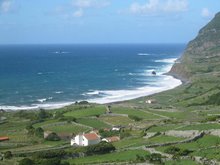
The first king in the book is Kenneth I, better known as Kenneth MacAlpin. He was King of Dalriada, the Gaelic Scottish kingdom centred on modern day Argyll. In about 843AD he became the king of Pictland as well and thus was born a "United Kingdom of Scots and Picts" called Alba. This was the nucleus of what was to develop into the kingdom of Scotland.
The exact process by which Kenneth achieved this union is not well understood by historians but it's not as simple as that he married an heiress and/or won a decisive battle of conquest. It was more likely the culmination of a drawn out process over decades (doubtless involving battles and marriages) but what we do know is that Pictish culture and language was replaced by Gaelic in a remarkably short space of time in the late 9th century.
Though Kenneth MacAlpin is listed as "the First King of Scotland", it's important to remember the limits of his kingdom of Alba: its southern boundary was the Forth-Clyde line rather than Solway-Tweed which eventually came to mark the south boundary of Scotland. The north boundary of Alba is uncertain but in the east it's likely to have been the Mounth - the watershed between the Rivers Tay and the Dee. To the north was a huge slab of territory south of the Norwegians (Vikings) in Caithness-Sutherland which historians call Moray. Its political relationship to Alba in the latter centuries of the first millenium AD is obscure even by the standards of the Dark Ages but I think I'm right in saying that Moray became "gaelicised" at around the same time as southern Pictland so take from that what you will.
What's most significant about the takeover of southern Pictland by the Scots of Dalriada in the mid-9th century is that it was the first in a series of "building blocks" by which the eventual kingdom of Scotland crystallised out of a series of smaller principalities. The same process was going on to the south in what would eventually become England but in the mid-9th century was still Wessex and Northumbria and sundry other -ssexes and -ias (and Vikings, Norwegian and Danish).
More of all that anon. but I leave you with a quiz question - Who was the last King of Scotland?
A. George VI
B. William III
C. James VI
D. James VIII
Fastest finger first!




7 comments:
James VI? Although he died in 17th century so isn't last king the one reigning in 1707? Anne? Charles II? You see why I need to be educated on the history of Scotland
I figure it'll be either Charles III or, if he's unable to succeed his mom, then William V. (Color me cynical)
non of the above
Kathie - Charles III and/or William V will never be kings of Scotland if I have anything to do with it.
Suze - Charles II was not one of the choices and Anne was a queen which ruled her out of being last king of Scotland.
The answer is (sorry le moulin) William III, better known as William of Orange, who was king of Scotland (and, separately, of England) from 1689 to 1701. He was actually William III of England and II of Scotland but, unlike the Jameses, the distinction is never made in practice.
As you say, the last monarch of Scotland was the one reigning in 1707, Anne (1701-14) who succeeded WIII (II) on both thrones.
James VI was the last king of Scotland to be (for part of his reign) not also king of England in that he had been the koS for 35 years before he inherited the throne of England in 1603.
George VI was the last king of the United Kingdom and "James VIII" was never the king of anywhere. He's the one in the picture - he was Bonnie Prince Charlie's father.
Neil & Carol, I was just pulling your collective leg. Plus I enjoy coloring outside the lines, so Charles III and William V were the two likeliest candidates for my attempted wit.
Of course, ya know that a few centuries ago American colonists fought a Revolution to overthrow the yoke of royalist tyranny. Leaving aside whaterver skill Brenda and Phil the Greek employ in fulfilling their duties, I'd say that royalty is an institution whose time has long, long since past -- and not only in Scotland!
Kathie
My point was rather that I earnestly hope there will never again be a kingdom of Scotland for CIII to succeed to. Some hope for it, but not me. I believe in the Union.
But I passionately hope that CIII and, thereafter, WV will succeed to the throne of the United Kingdom.
You may think "Brenda" and "Phil the Greek" - as you refer to our sovereign and her husband - have had their day but I'd remind you that the countries which went on to form the UK had their revolutions in the 17th century and the result was a constitutional monarchy. We had our revolution 100 years before the French. 200 years before Germany was ever thought of. 300 years before the Russian Revolution was finally settled.
We got there before any of them and have been an extremely successful and enduring democracy throughout.
Constitutional monarchy has served the UK excellently for 350 years now and if it ain't broke don't fix it - case study on Russia's republic in the 1920s anyone? Germany's in the 1930s? Or the USA's in the 1860s perhaps?
Discuss.
Couldn't have put it better myself and, after all, the idea of the current UK government reforming anything is, quite frankly, terrifying.
Post a Comment